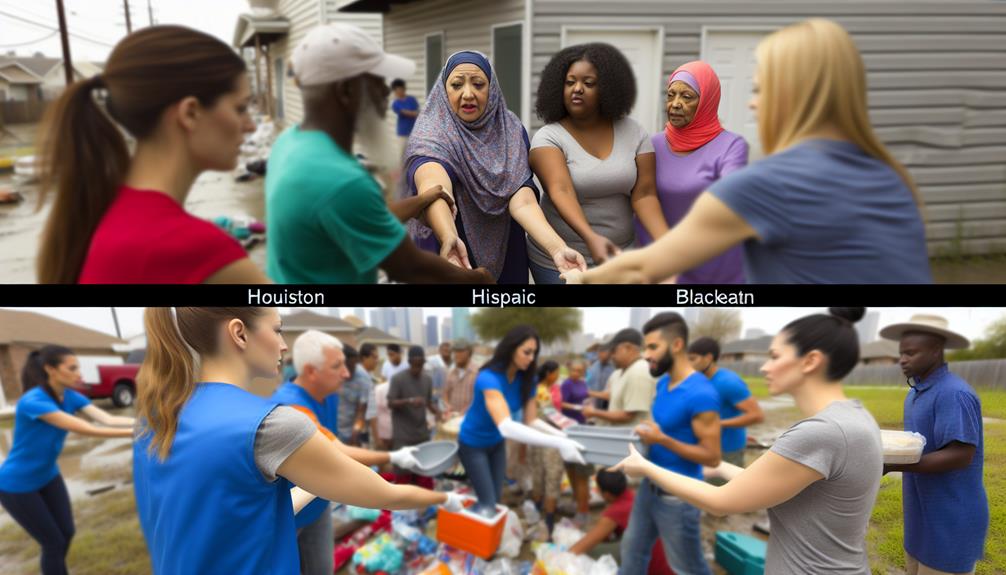When disasters strike, it's crucial to offer targeted support to Houston's vulnerable populations as they navigate the challenges they face. Understanding the specific hurdles these communities encounter allows for tailored initiatives that can provide effective assistance and ensure fair outcomes.
Whether it's ensuring access to vital resources or tackling underlying systemic issues, there are key strategies that can significantly impact the well-being and recovery of those most in need during crises.
Vulnerable Populations in Houston
In Houston, communities that are often overlooked, particularly Black and Hispanic residents, continually struggle to access necessary resources when disasters strike. These underserved groups in Houston face significant obstacles in obtaining fundamental needs like healthcare, secure housing, and transportation during times of crisis.
The challenges become even more pronounced for Black and Hispanic individuals in the aftermath of natural calamities such as Hurricane Harvey, with recovery efforts lagging behind in these communities. The absence of adequate healthcare coverage exacerbates the hardships faced by vulnerable populations, limiting their access to essential medical services when emergencies arise.
It's crucial to prioritize and meet the needs of these marginalized communities during disasters to ensure a fairer and more resilient recovery process for all Houstonians. By addressing the specific difficulties faced by Black and Hispanic individuals during disasters, we can strive towards developing more inclusive and efficient disaster response strategies.
Disasters Impacting Houston Communities
Houston neighborhoods have faced a series of tough blows from disasters like Hurricane Harvey, Tropical Storm Imelda, and the recent winter storm, hitting vulnerable communities hard. Here's how these challenges play out for Houstonians:
- Property Damage: Many Houston residents, especially those in marginalized communities, deal with significant property damage after disasters, leading to housing insecurity and financial strains.
- Financial Setbacks: The aftermath of these disasters often means economic hardships for Houston locals, disrupting jobs and worsening financial struggles, especially for those already vulnerable.
- Limited Healthcare: Access to healthcare becomes a real concern during and post-disasters, putting Houstonians' well-being at risk, particularly for those needing medical support.
These crises don't just impact buildings and roads; they also take a toll on the mental and emotional health of Houston residents. This underscores the pressing need for substantial support and resources to aid these communities in recovery and resilience-building efforts.
Socioeconomic Challenges in Disasters
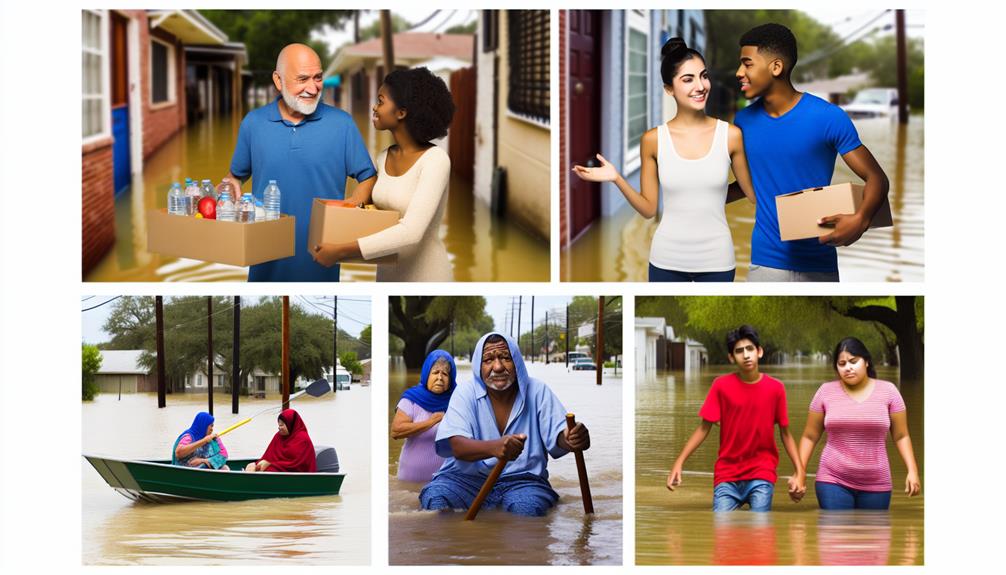
I've seen firsthand how economic gaps hit hard during disasters, especially for communities in Houston. When resources aren't equally distributed, it hits low-income folks, particularly people of color, the hardest.
We need to tackle these economic hurdles head-on to make sure everyone, especially the most vulnerable, can access crucial things like healthcare, housing, and transportation on an equal footing.
Economic Disparities Impact
In the midst of disasters, the stark impact of economic disparities on vulnerable populations in Houston is crystal clear. Neighborhoods like Third Ward, Fifth Ward, and Kashmere Gardens face tough socioeconomic challenges that only get worse during crises. With over 60% of Houston residents identifying as Black or Hispanic, these communities bear a heavy burden.
The lack of essential resources such as healthcare, safe housing, and transportation intensifies the struggles, making recovery an uphill battle. It's crucial to address these economic disparities to offer the needed support and resources for underserved neighborhoods to bounce back effectively.
Resource Allocation Disparities
In times of crisis, the inequalities in distributing resources become stark, especially affecting vulnerable communities in Houston. When disasters strike, marginalized groups encounter significant obstacles due to unfair access to vital resources like healthcare, secure housing, and transportation.
These disparities, rooted in socioeconomic factors, worsen the impact of natural disasters on Black and Hispanic populations in Houston. The slow recovery rates post-disaster in the Greater Houston area highlight the urgent need to address these unfair resource distributions.
Enhancing the well-being and resilience of underserved neighborhoods during disasters in Houston hinges on fair resource allocation and robust support systems. Prioritizing equitable resource distribution is key to building a more inclusive and efficient disaster response approach for all community members.
Racial Composition Considerations
In a diverse city like Houston, it's vital to ensure fairness in distributing assistance to meet the unique needs of Black and Hispanic communities during emergencies. Training response teams to be culturally aware can help them better support these vulnerable groups.
Additionally, providing language services is crucial for effectively communicating important information to residents who don't speak English.
Equity in Aid
When it comes to supporting Houston's vulnerable communities during disasters, it's crucial to consider the racial makeup to ensure a fair distribution of aid and resources. Here are three key points to focus on when striving for equity in aid for marginalized groups:
- Tailoring Assistance to Cultural Needs: Customizing aid programs to meet the specific requirements of diverse racial groups within vulnerable populations.
- Ensuring Language Accessibility: Making sure information and resources are available in multiple languages to guarantee all individuals can access and benefit from aid services.
- Engaging with the Community: Collaborating with local community leaders and organizations in the aid distribution process to establish trust and ensure resources reach those who need them the most.
Cultural Sensitivity Training
In making sure cultural sensitivity training hits the mark for disaster response in Houston's diverse community, it's crucial to focus on the unique needs of residents from various racial backgrounds. With a majority of Houstonians identifying as Black or Hispanic, tailored training is key to addressing how disasters disproportionately affect these groups.
By honing in on the city's racial makeup, programs can help bridge gaps in vital resources like healthcare, safe housing, and transportation for communities at risk during crises. This targeted strategy not only raises awareness about prevalent mental health challenges in underserved areas but also fosters inclusivity and fair support for all residents when disaster strikes.
Disaster response training that takes Houston's diverse racial landscape into account is essential for delivering effective assistance to vulnerable populations.
Language Access Services
Houston's vibrant diversity shines through with over 145 languages spoken in the city. Making sure everyone can access vital disaster information and resources is key to effective support during tough times. When it comes to language services, it's crucial to consider the racial makeup of communities to craft inclusive disaster response plans that work for everyone.
Here's what to keep in mind:
- Tailoring language services to fit the needs of immigrant communities boosts disaster readiness and response.
- Offering multilingual support during crises is vital for effectively reaching communities of color.
- Language barriers can hit vulnerable groups harder, underscoring the need for communication strategies that include everyone.
Health Conditions and Disaster Response
When disasters hit, folks dealing with chronic health issues in Houston face some serious challenges that need quick thinking and smart health solutions. Conditions like asthma, diabetes, and heart problems can get way worse during emergencies, so getting access to healthcare, meds, and medical gear is crucial.
In these tough times, it's vital for disaster response teams to put the spotlight on the special needs of folks with health issues to keep them safe and sound. Joining forces with healthcare pros, emergency crews, and local groups is key to looking out for the health of vulnerable folks during disasters.
Building up communities is a big deal in setting up the right support and resources to tackle health worries for those with chronic conditions when things get tough. By teaming up and putting targeted plans into action, Houston can do a better job of shielding and helping individuals with health issues during emergencies, ultimately boosting the whole community's ability to bounce back.
Community-Centric Climate Dashboard Benefits
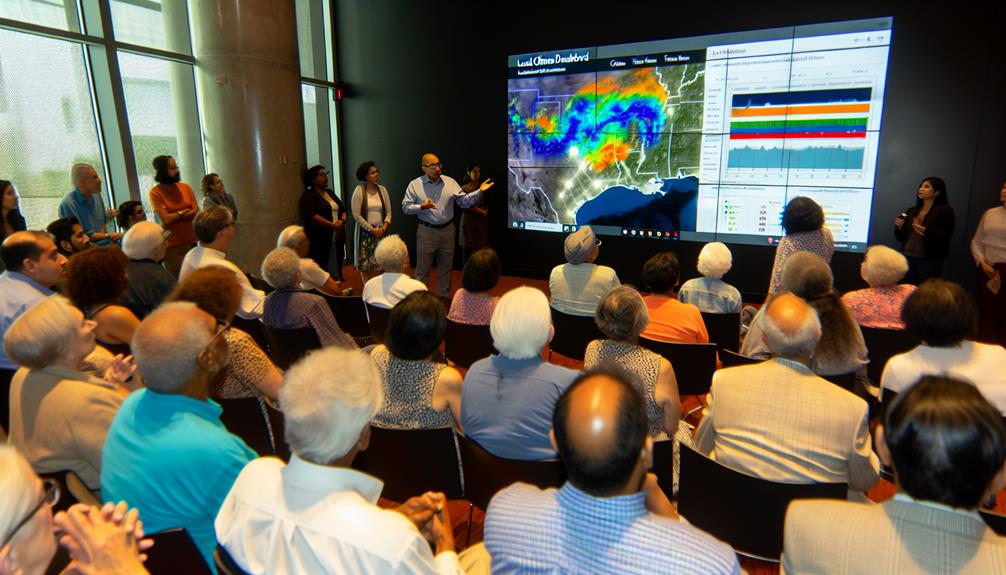
When disasters hit, having access to a community-focused climate dashboard can make a world of difference for your neighborhood. This dashboard isn't just a tool—it's a lifeline during tough times, offering some key advantages:
- Building Community Bonds: By letting locals share their experiences and photos from past disasters, the dashboard creates a strong sense of unity and empathy among residents. This shared connection helps everyone stand stronger together when facing challenges.
- Getting Residents Involved: People can actively engage with the dashboard, pitching in to make their community more resilient in the face of climate issues. This hands-on approach empowers individuals to take part in the recovery efforts for their area.
- Supporting Mental Health: The dashboard focuses on understanding how disasters affect the mental well-being of adults with chronic conditions. By providing insights and resources, it aims to raise awareness about mental health and offer support to those in underserved areas.
With these features, the community-centered climate dashboard plays a crucial role in assisting vulnerable populations in your community during emergencies.
Mental Health Support Initiatives
In tough times, it's so important to know that there are crisis helplines ready to offer immediate support.
Community counseling services provide a safe space where you can open up about your feelings and experiences, helping you navigate through challenging situations.
Trauma-informed care programs offer specialized help tailored to the unique needs of those affected by disasters.
It's comforting to have these resources available when you're going through a crisis, offering a guiding hand when you need it most.
Crisis Helplines Available
If you ever find yourself feeling overwhelmed during a tough time, remember that Houston has crisis helplines ready to provide immediate support for your mental health. These helplines are a lifeline for individuals going through challenges, ensuring they get the help they need right away.
Here's why reaching out to these services can make a difference:
- Prompt Support: Trained professionals are there to offer immediate guidance and assistance precisely when you need it.
- Access to Resources: These helplines can connect you with resources and other services to address different mental health needs you may have.
- Community Connection: By reaching out to these helplines, you can join a supportive community that understands how to help individuals navigate through tough times of trauma and anxiety.
Community Counseling Resources
Community Counseling Resources in Houston are like strong pillars of support, offering vital mental health services tailored to help vulnerable populations during tough times. Nonprofit organizations play a key role in delivering these services, with a focus on areas such as Third Ward, Fifth Ward, and Kashmere Gardens to address increased vulnerabilities.
These efforts aim to establish a community-centered environment and health hub jointly managed by residents, promoting the sharing of stories and coping mechanisms. By actively participating in the hub, residents contribute to improving their quality of life and resilience in the face of climate-related challenges.
The objective is to raise awareness about mental health issues, provide essential recovery resources, and empower residents to navigate disaster impacts effectively.
Trauma-Informed Care Programs
When disasters strike, like in Houston, Trauma-Informed Care Programs step in to support those most in need. These programs are lifelines, offering tailored mental health support to help individuals in underserved communities cope with the aftermath of natural disasters.
Here's a glimpse into how these programs make a difference:
- Personalized Assistance: Houston's Trauma-Informed Care Programs provide customized resources to help individuals deal with the mental strain brought on by disasters.
- Deep Community Connections: By engaging closely with communities, these programs create and implement mental health strategies that truly address the unique needs of residents.
- Building Resilience: The primary focus of these programs is on empowering individuals in Houston's hardest-hit areas to bounce back and find healing after facing the brunt of natural disasters.
Empowering Residents in Disaster Preparedness
In Houston, we're all about equipping our community with practical skills to handle disasters. Our focus is on reaching out to vulnerable groups and making sure they're prepared. Our programs are tailor-made to help residents develop strategies that work for them and their unique challenges.
We've got community leaders teaming up to create climate and health dashboards where folks can share stories and find resources easily.
One big goal is to make sure everyone, no matter their income, has what they need to face disasters head-on. We're especially looking out for adults dealing with chronic conditions and the mental toll disasters can take on them. Our end game? We want to set up a model that can be used in other underserved areas down the line.
Awareness of Mental Health Issues
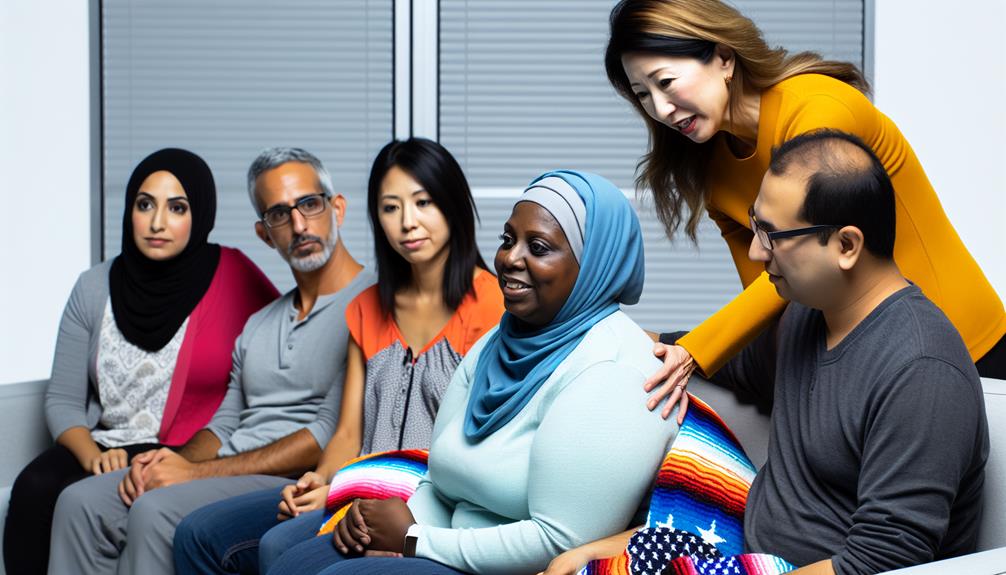
When it comes to mental health challenges in Houston, where a majority of the population identifies as Black or Hispanic, the impact on vulnerable communities during disasters is significant. Factors like limited access to healthcare, secure housing, and transportation only worsen the situation for these groups.
To address this issue, a new community-centered climate and health dashboard is in the works, starting in neighborhoods like Third Ward, Fifth Ward, and Kashmere Gardens. The goal is to create a model that can be expanded to support the wider community.
Here are some practical steps to boost mental health awareness and assistance:
- Tailor mental health resources to fit different cultures: Adapting support services to the unique needs and backgrounds of vulnerable populations can make a real difference in their effectiveness.
- Spread the word about mental health in an accessible way: Educating these communities about mental health issues and coping mechanisms is key to building resilience.
- Build local support systems: Establishing networks of support and cooperation within neighborhoods ensures that mental health resources reach those who need them most.
Recovery Efforts in Underserved Areas
In Houston, the focus is on helping underserved areas bounce back from challenges, especially those that have long been left out.
The Vice President of Houston is taking the lead in bringing together different groups to support neighborhoods like Third Ward, Fifth Ward, and Kashmere Gardens. These areas, home to many marginalized communities, have been hit hard by disasters.
The aim is to make sure that people of color, those with disabilities, and families with low incomes get the help they need to recover. By teaming up with local organizations, they're creating plans that suit the specific needs of these communities and can be sustained over time.
Climate Challenges and Quality of Life
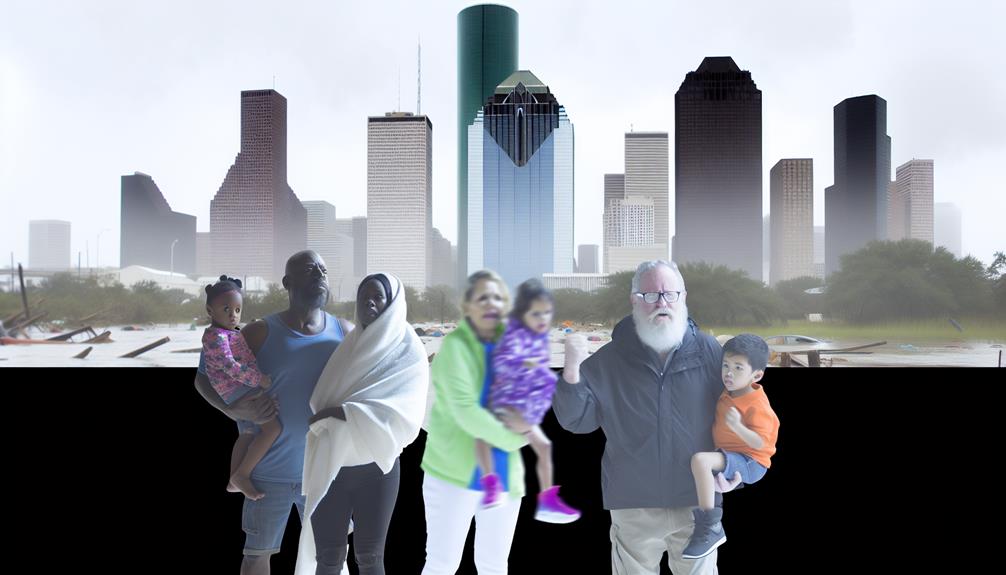
Houston is really feeling the heat when it comes to climate challenges, especially for our Black and Hispanic communities. These folks are facing some tough times due to the impact of climate issues, which is seriously affecting their day-to-day lives.
Let's break it down:
- Healthcare Hurdles: Getting proper healthcare is a big deal for everyone in Houston, but it's even tougher for Black and Hispanic folks. They're dealing with extra obstacles in getting the care they need, which is made worse by climate-related health issues.
- Housing Woes: Having a safe and affordable place to live is key for a good life. Unfortunately, many Houston residents, especially those from minority backgrounds, are struggling to find decent housing. This leaves them more vulnerable to the harsh effects of extreme weather events.
- Transportation Troubles: Having reliable transportation is a must for getting around and staying safe during emergencies. But in underserved neighborhoods, options are limited, which can leave already at-risk communities even more isolated when climate disasters strike.
It's clear that these challenges are hitting close to home for many Houstonians, and it's time we take real action to support those most affected.
Disaster Preparedness for Houston's Neighbourhoods
Supporting Houston's vulnerable communities during emergencies calls for proactive and detailed disaster readiness plans tailored to each neighborhood's specific needs. The City of Houston is ramping up its disaster preparedness efforts in local communities through initiatives like the 2022 Fair Housing & Hurricane Season Preparedness Outreach Program. This program is designed to focus on historically marginalized groups, including communities of color, people with disabilities, immigrant populations, individuals with limited English proficiency, and households with lower to moderate incomes. Through grants of up to $10,000, the City aims to boost awareness of fair housing and resilience within these communities.
To get involved in this program, interested individuals must attend a Fair Housing 101 Workshop, sign up as a vendor for the City, and be actively registered in the System for Award Management (SAM). Important deadlines for the program include submitting applications by May 6, 2022, with grant announcements slated for May 27, 2022. These proactive steps empower neighborhoods to better prepare for disasters and protect their residents.
Frequently Asked Questions
What Is a Catastrophe for Houston's Most Vulnerable People?
Have you ever wondered what a crisis really means for the most vulnerable in Houston? Picture this: losing access to healthcare, safe housing, and transportation when disasters strike, making economic hardships and mental health issues even worse. They urgently need our help and support.
How Vulnerable Is Houston to Hurricanes?
Living in Houston, we're no strangers to the threat of hurricanes with our proximity to the Gulf and flat terrain. It's essential to be ready for potential flooding and wind damage. Stay updated on the latest information and make sure you have a solid plan in place to safeguard yourself and your community.
Who Are the Vulnerable Populations During a Disaster?
In times of crisis, it's crucial to remember that some of the most vulnerable groups in Houston are communities of color, people with disabilities, immigrant populations, those with limited English skills, and households with lower to moderate incomes. Meeting their specific needs is key to ensuring an effective response and recovery from disasters.
What Do Disaster Victims Need Most?
In times of crisis, you need immediate access to a safe place to stay, food, water, and medical assistance. It's also crucial to have emotional support, financial aid for rebuilding, and access to community resources like housing and transportation. Working closely with relief organizations is key to ensuring a successful long-term recovery process.
